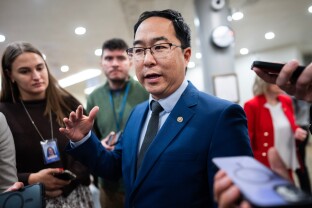Over the course of four weeks, lawmakers have made zero progress toward negotiating a deal to reopen the government.
The slow drip of the shutdown has dragged on, from partial paychecks to missed paychecks altogether, with fairly few surprises. Democrats swear they are more dug in than ever and think more leverage could be headed their way.
“This has been building,” Sen. Chris Van Hollen said. “And Republicans left in place this ticking time bomb. It’s about to explode and create this huge increase in people’s health care costs. So we’ve been trying to diffuse this ticking time bomb from the beginning.”
Sign Up for NOTUS’ Free Daily Newsletter
Democrats have maintained their singular demand: for Republicans to negotiate a deal to extend Affordable Care Act subsidies before premiums skyrocket. Premium notices for 2026 are set to go out on Nov. 1 when ACA open enrollment begins. There has been a theory (or wishful thinking, at least) around Capitol Hill that the date would be a turning point for Democrats. Getting insurance companies to undo planned increases would be far more complex than extending subsidies ahead of time.
That could mean Democrats say they tried their best, throw their hands up, blame Republicans and cave. Yet several Senate Democrats before leaving town last week suggested they are not inclined to switch it up any time soon.
“We feel more determined than ever,” said Sen. Andy Kim. “We’re hearing from constituents about how much more they’re going to have to pay, that this is going to be a health care crisis for this country, even beyond what we’re seeing, and especially on top of what happened with Medicaid early this year.”
To hear Democrats tell it, the expiring subsidies actually help their case. What Democrats are fighting to avoid becomes tangible, and case studies of the impact of rising health care costs will be evident across the country.
“I think it will put pressure on the Republicans,” said Sen. Angus King, one of the three members of the Senate Democratic Caucus who has been voting with Republicans on the short-term funding bill of this week’s tipping point.
Senate Minority Whip Dick Durbin told reporters of the Nov. 1 date: “I think there could be a backlash to their position about the so-called clean bill, if they realize that that clean bill leaves them with health insurance premiums they can’t afford. This notion of we’ll get around to this problem sometime in the future — I don’t think it’s very credible.”
What’s more, the troops are paid for now, at least, air traffic controllers might be next, and there are talks about standalone legislation to pay additional groups.
In short: at least some pain points of the shutdown could soon be — or have been — eased.
Senate Minority Leader Chuck Schumer, whose endgame for the shutdown remains opaque, told reporters that the Nov. 1 date “should change Republicans’ calculus, that they should sit down and negotiate a way to address this crisis.”
Republicans don’t see a reason to do so: They continue to have control over each chamber and the White House and have shown no signs of bending to their colleagues’ demands.
“The Democrats are holding this country hostage,” Sen. John Barrasso said after a meeting with President Donald Trump at the White House last week. “It’s time for it to end. It is time to reopen the government for all of the people in the United States.”
And there are other, new pain points of the shutdown quickly approaching. The Supplemental Nutrition Assistance Program and Women In Crisis benefits are running out, an issue that could cause great pains for Democrats who champion those programs.
There is legislation circulating to address those benefits’ lapse. But beyond that, Democrats have been hesitant to engage in too many piecemeal conversations about covering some costs of the shutdown versus others. Sen. Chris Murphy said, “They want us to be in a conversation about managing the shutdown, to absolve themselves of responsibility for causing the shutdown.”
“They should negotiate,” Murphy said of Republicans. “They should sit down at the table.”
Democrats have positioned themselves behind a bill from Sen. Gary Peters to pay all federal workers during the shutdown, but that was blocked on the floor last week.
There are also signs some Democrats feel heat. Georgia Sens. Raphael Warnock and Jon Ossoff, the most vulnerable Senate Democratic incumbent, voted with Republicans last week on a bill that would have paid active-duty military, air traffic controllers, Transportation Security Administration agents, border patrol agents and other essential workers during the government shutdown.
Democratic Sen. John Fetterman also voted for the bill, though he has been voting with Republicans on the continuing resolution for weeks.
But both Georgia senators have otherwise continued to vote against reopening the government, and not one Democrat has changed their vote on the continuing resolution since the start of the shutdown. There have been 12 failed votes on that same bill, and Senate Majority Leader John Thune has warned they will keep coming.
Democrats swear they are prepared, and whatever the week brings.
“When the premiums go up on Nov. 1, we still have mechanisms to try to make the payment a little bit less,” Murphy said. “Maybe Republicans think that they can just hold out and not negotiate until Nov. 1, and this issue will go away … It’s the exact opposite. “
Sign in
Log into your free account with your email. Don’t have one?
Check your email for a one-time code.
We sent a 4-digit code to . Enter the pin to confirm your account.
New code will be available in 1:00
Let’s try this again.
We encountered an error with the passcode sent to . Please reenter your email.


